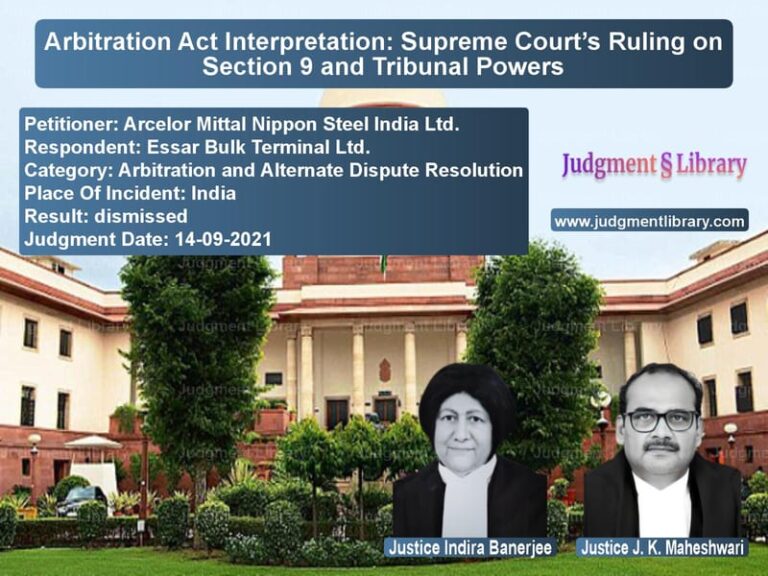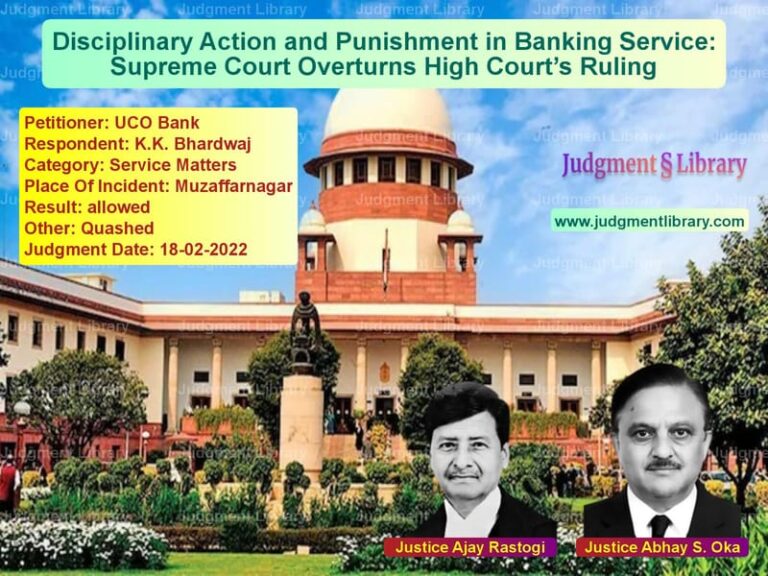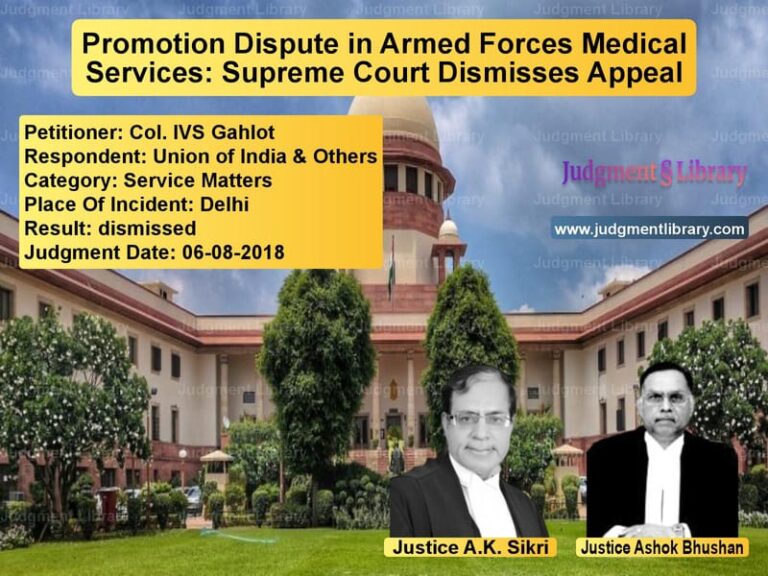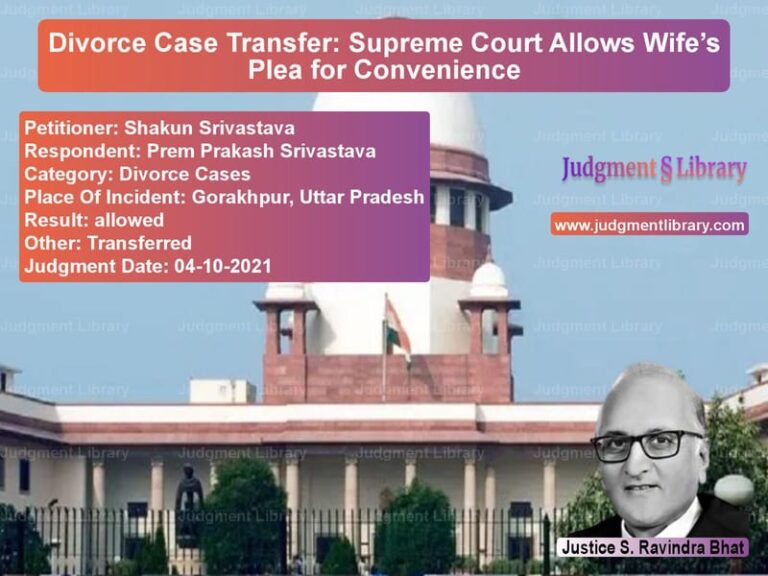Forgery Allegations in Property Sale: Supreme Court Quashes Criminal Case Pending Civil Suit
The Supreme Court of India recently ruled in the case of R. Nagender Yadav vs. The State of Telangana & Anr., addressing allegations of forgery in a property transaction. The Court set aside criminal proceedings against the appellant, ruling that since a civil suit regarding the property’s ownership was already pending, allowing parallel criminal prosecution would be unjustified.
The judgment emphasizes that criminal cases based on property disputes should not proceed when the same issue is being litigated in civil courts. The ruling clarifies the distinction between civil and criminal liability in cases of alleged document forgery.
Background of the Case
The case originated when the complainant alleged that his property had been fraudulently transferred using a forged sale deed. The dispute centered around an open plot of 321 square yards in Nallagandla, Telangana.
The key events leading to the case were as follows:
- May 9, 2008: The complainant purchased the property through a registered sale deed.
- December 29, 2010: The property was allegedly transferred fraudulently to a third party.
- April 24, 2014: The complainant filed a criminal complaint alleging that the sale deed had been forged.
- 2016: The complainant also filed a civil suit seeking cancellation of the disputed sale deed.
- June 1, 2021: The Telangana High Court refused to quash the criminal proceedings.
- December 15, 2022: The Supreme Court set aside the criminal case, ruling that the issue should first be settled in civil court.
Arguments by the Appellant (R. Nagender Yadav)
The appellant, represented by his legal counsel, argued:
- The dispute was purely civil in nature and should be resolved in the ongoing civil suit.
- The complainant had voluntarily signed the disputed sale deed and later fabricated allegations of forgery.
- The police investigation was flawed and failed to establish any forgery.
- Since the civil suit was pending, allowing parallel criminal proceedings would lead to conflicting judgments.
Arguments by the Respondents (State of Telangana & Complainant)
The prosecution and complainant countered:
- The complainant’s signature on the sale deed had been forged.
- The appellant played a key role in the fraudulent transaction and was an attesting witness to the sale deed.
- The police had found sufficient grounds to charge the appellant with cheating and forgery.
Supreme Court’s Judgment
The Supreme Court quashed the criminal proceedings and ruled:
- The issue was civil in nature and should be decided in the pending civil suit.
- Allowing parallel criminal proceedings would prejudice the accused and lead to legal inconsistencies.
- “A complaint disclosing civil transaction may also have a criminal texture. But the High Court must see whether the dispute which is in substance of a civil nature is given a cloak of a criminal offence.”
- If the civil court finds that the sale deed was forged, the complainant may pursue criminal action later.
Key Precedents Cited
The Supreme Court referred to several landmark cases, including:
- State of Haryana vs. Bhajan Lal (1992): Established guidelines for quashing criminal cases.
- Zandu Pharmaceutical Works vs. Mohd. Sharaful Haque (2005): Emphasized that criminal law should not be used for civil disputes.
- Gian Singh vs. State of Punjab (2012): Clarified the scope of Section 482 CrPC in quashing cases.
Impact of the Judgment
The Supreme Court’s ruling has major implications:
- Prevents abuse of criminal law in property disputes.
- Clarifies the distinction between civil and criminal liability.
- Upholds due process by ensuring that civil disputes are settled in civil courts first.
Conclusion
The Supreme Court’s decision in R. Nagender Yadav vs. The State of Telangana & Anr. ensures that criminal proceedings are not misused in property disputes. The ruling upholds the principle that civil disputes must be settled in civil courts first, preventing unnecessary criminal trials that could unfairly prejudice the accused.
The verdict sets an important precedent, reinforcing the role of the judiciary in maintaining a clear separation between civil and criminal legal remedies.
Petitioner Name: R. Nagender Yadav.Respondent Name: The State of Telangana & Anr..Judgment By: Justice S. Abdul Nazeer, Justice J.B. Pardiwala.Place Of Incident: Telangana.Judgment Date: 15-12-2022.
Don’t miss out on the full details! Download the complete judgment in PDF format below and gain valuable insights instantly!
Download Judgment: r.-nagender-yadav-vs-the-state-of-telanga-supreme-court-of-india-judgment-dated-15-12-2022.pdf
Directly Download Judgment: Directly download this Judgment
See all petitions in Fraud and Forgery
See all petitions in Property Disputes
See all petitions in Judgment by S. Abdul Nazeer
See all petitions in Judgment by J.B. Pardiwala
See all petitions in allowed
See all petitions in Quashed
See all petitions in supreme court of India judgments December 2022
See all petitions in 2022 judgments
See all posts in Criminal Cases Category
See all allowed petitions in Criminal Cases Category
See all Dismissed petitions in Criminal Cases Category
See all partially allowed petitions in Criminal Cases Category







